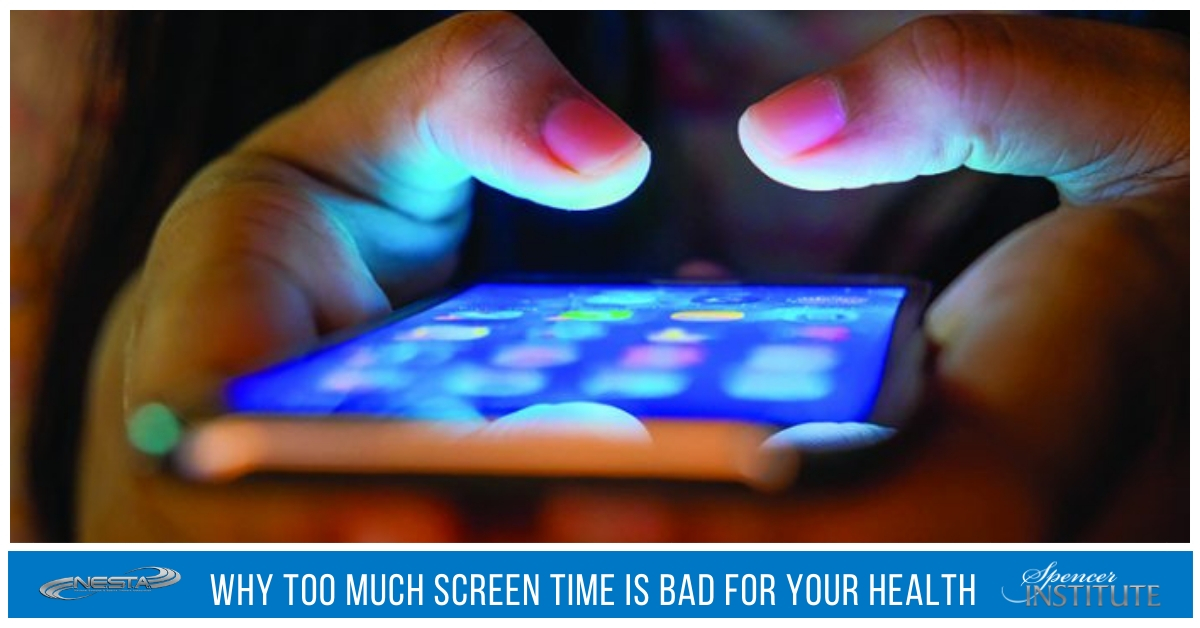Why Too Much Screen Time is Bad for Your Health

Before you continue to read this, take a moment to observe those around you. Chances are, you see at least one person engrossed in his or her phone. Likely, it’s more than just one person. And while most studies about screen time are focused upon its effect on children and their development, it’s important to note that screen time can have negative effects on adult clients as well.
On average, adults spend about 11 hours a day staring at some kind of screen, whether that be a computer, phone, tablet, TV or other type of electronic device. For office workers, some of that is unavoidable, but that extra recreational screen time isn’t doing your clients any favors.
Weight Gain
As little as two hours of TV a day can increase the risk of weight gain, diabetes, and heart disease in adults. There are likely several factors to blame, including a sedentary lifestyle, less sleep, and generally bad eating habits when engrossed into a screen.
Vision Issues
Looking at a screen for extended periods of time can cause computer vision syndrome. The symptoms: strained, dry eyes, blurred vision, and headaches.
Chronic Neck & Back Pain
Poor posture when using screens combined with can cause chronic neck, shoulder, and back pain.
Poor Sleep
Studies link heavy computer and smartphone use to increased sleeping issues. The blue light from digital devices suppresses the sleep-promoting hormone melatonin, keeping us from having restful sleep.
Impaired Cognitive Function
Cognitive imaging studies have found that spending too much screen time will lead to less efficient information processing.
Lowers Cardiovascular Health
Studies have indicated that spending significant time with screens — whether it’s a TV, computer or tablet, lowers your cardiovascular health and increases your mortality risk.
Are You Addicted to Your Screen?
Tech addiction impacts the same area of the brain as drugs and alcohol. The signs of digital addiction mimic the signs you see in someone who’s an alcoholic. People are constantly nagging them about their use, so they find creative ways to lie or conceal use from their family or spouse.
Even if you’re not addicted, you might experience the negative effects of too much phone use. In fact, excessive phone use has been linked to depressive symptoms and suicidal thoughts. Some experts believe that cellphone use is also stunting our ability to connect with one another in real life. Research suggests that the mere sight of a cellphone can be hugely distracting during a conversation.
Setting the Right Limit for You
If you are interested in going on a technology diet, how can you figure out a limit that works for your life?
Think about what you really want and need to do in your life. Is your technology use stopping you from doing those things? For example, are you getting enough sleep, exercise or time outdoors? For adults, it’s likely more practical to set limits based on what you want and need to accomplish rather than time on the clock.
Putting a few healthy habits in place can help keep you in check. In addition to eating without your phone in hand and taking walks without your headphones on, don’t keep your phone by your bed. Instead, put it to sleep in a different room and get some things done in the morning without checking it.
Turning off all your notifications can help you set firmer technology boundaries. When you’re not at work, be mindful of how much time you’re spending on your phone or other screens.
Not only will you be able to accomplish more by limiting your at-home technology use, but you’ll also be able to think more clearly and creatively while you do it. It’s a major incentive to reduce your screen time.
Screen Time Recommendations for Adults
While there’s no current consensus on how much screen time is too much for adults, there are a few things you can do to reduce the amount of time you spend on an electronic device and mitigate some of the effects:
While working on a computer, look away and at a distant object for about 20 seconds every 20 minutes — set a reminder if necessary.
Take a quick standing stretch break every hour.
Learn a few yoga stretches to keep muscles loose.
Pay attention to your posture.
Don’t eat in front of a screen.
Avoid backlit screens for an hour before bed.
Note how long you spend on electronic devices and replace some of that with physical activity and social interaction
Getting Started
Every one of your coaching clients wants results. That’s exactly why becoming a Certified Results Coach is a great choice. You will learn very high-level, yet easy-to-follow, strategies and methods for helping your clients achieve the exact results they desire.
The Online Coaching Certification is your step-by-step blueprint to build a highly profitable online coaching business.
If you are passionate about helping people and living a fulfilling life, we can help you achieve your dreams right now. The Life Strategies Coaching Certification Course combines the latest advancements in human potential and neuroscience with proven methods of success used by the world’s most productive people.
There is always something exciting about earning a new training or coaching certification and applying that new knowledge of how you train your clients. This also helps you hit the reset button.
Our programs are open to anyone with a desire to learn and help others. There are no prerequisites.
That’s it for now.
Take action!
PS: Click here to see many helpful business and career resources for coaches and trainers










